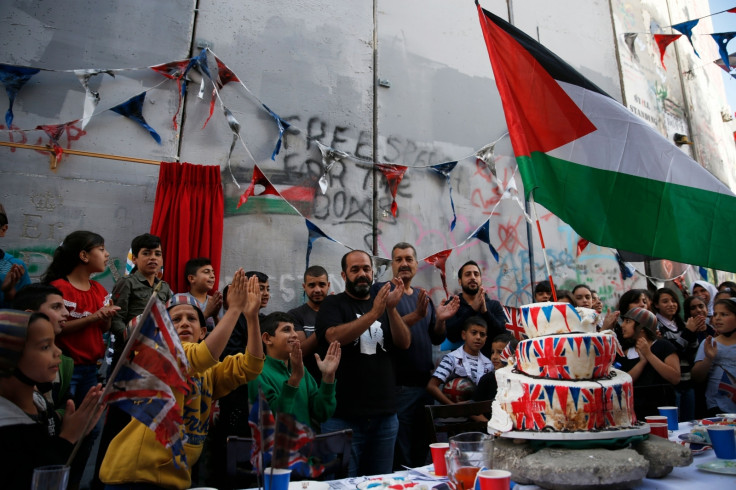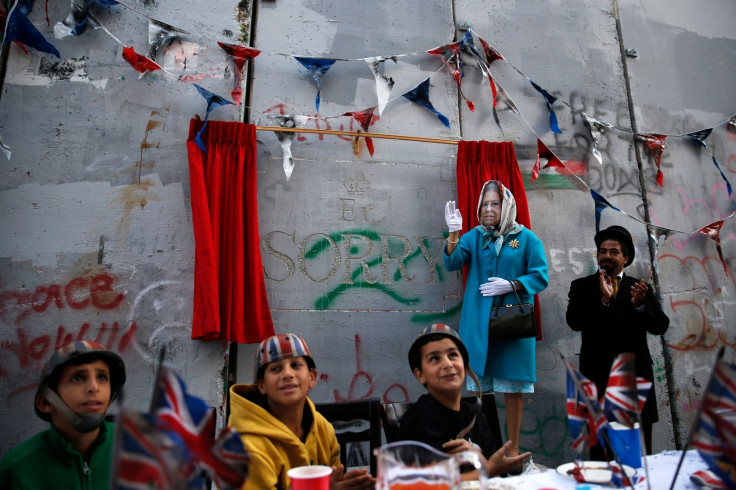'Queen Elizabeth II' unveils Banksy apology for Balfour Declaration in Palestine
Street artist etched latest artwork in Israeli separation wall as he bemoaned 'suffering on all sides'.
The British street artist Banksy held an "apology tea party" near his hotel in the occupied West Bank on Wednesday (1 November) to mark the 100th anniversary of the Balfour Declaration.
Heads turned as an actor dressed as Queen Elizabeth II unveiled the secretive artist's latest piece, a plaque which read: "Er... Sorry"
The apology – a play on the common initials for Elizabeth Regina – was etched into Israel's controversial concrete separation wall which cuts through Palestinian territory.
It comes as Thursday marks the 100th anniversary of the Balfour Declaration, a 1917 document which saw the British government say it viewed "with favour the establishment in Palestine of a national home for the Jewish people".
The document, now kept in London's British Library, is seen by Palestinians as giving away their homeland, while Israelis celebrate it as having paved the way for the establishment of the Jewish nation state.
In typically surreal style, Banksy's event saw 50 children mark the event by wearing bullet-ridden Union Jack party helmets and waving tattered British flags as they sat down for a tea party.
The children came from the nearby al-Aida refugee camp and were said to be descendants of Palestinians who were forced to flee their homes in the 1948 Arab-Israeli war.
"This conflict has brought so much suffering to people on all sides. It didn't feel appropriate to 'celebrate' the British role in it," Banksy wrote in a statement.
"The British didn't handle things well here – when you organise a wedding, it's best to make sure the bride isn't already married."
The event happened near Banksy's Walled-Off Hotel near Bethlehem, which opened in March and which has rooms looking out onto Israel's separation wall.
It is understood the artist, who closely protects his identity, did not attend the tea party.
But not all were happy with the way the tongue-in-cheek event had been held.
A group of activists from al-Aida crashed the party and planted a large Palestinian flag in the middle of a cake.
"We came because we didn't like the use of the British flags or the way they were using Palestinian children," Munther Amira told the Guardian.

Despite the controversy, the British government has said it will mark Thursday's anniversary "with pride," with Prime Minister Theresa May planning to attend a celebratory dinner with Israeli counterpart Benjamin Netanyahu in London.
Labour leader Jeremy Corbyn, however, declined an invitation to the dinner and asked his shadow foreign secretary, Emily Thornberry, to attend in his place.
The apparent snub seems to be a continuation of Corbyn's longtime support for the Palestinian cause, which sees the Balfour Declaration as a scandalous moment in the region's history.
The declaration was the culmination of discussions between British Zionist leaders seeking political recognition of their goals for Jewish statehood and British politicians embroiled in the First World War.
Written by British Foreign Secretary Lord Arthur Balfour and addressed to Lord Lionel Walter Rothschild, a British financier and Zionist leader, the declaration promised British assistance to create a Jewish homeland.
"It's so divisive even today because Zionists think that the Balfour Declaration laid the foundation stone for modern Israel – and they're right to think that – and by the same token non-Jewish Palestinians and Arabs see it as the foundation stone of their dispossession and misery," said Jonathan Schneer, a historian who authored a book on the document.
"Everything stems from the Balfour Declaration."
Aside from the historic symbolism of Thursday's event, Netanyahu has also been heavily criticised for his support of Jewish settlements in the occupied West Bank.
The settlements are illegal under international law and seen by the UK and others as a threat to a viable, future Palestinian state.























